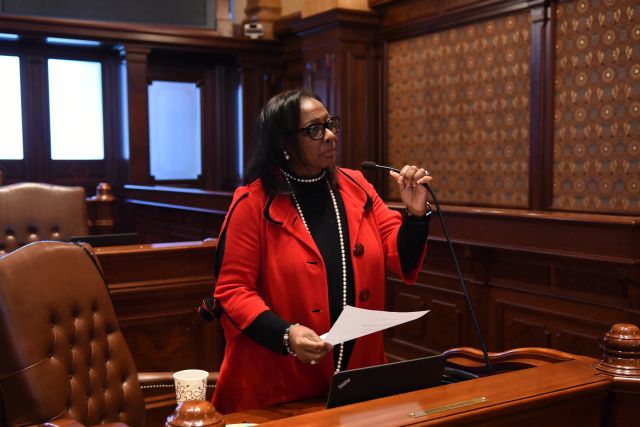Women's heart health is why we "Go Red"
- Details
- Category: News
 Members of the Illinois General Assembly showed their support of the American Heart Association’s "Go Red for Women" campaign in the Capitol today. Go Red for Women encourages women to know their risks and take action to protect their health.
Members of the Illinois General Assembly showed their support of the American Heart Association’s "Go Red for Women" campaign in the Capitol today. Go Red for Women encourages women to know their risks and take action to protect their health.
Cardiovascular disease claims the lives of nearly 500,000 American women each year. The American Heart Association created Go Red for Women to empower women to take charge of their heart health.
Senators Hunter, Trotter vote for MAP grant funding
- Details
- Category: Frontpage
 SPRINGFIELD – Over 128,000 low-income college students who rely upon MAP grants may soon receive funding. Today, Chicago Democrats State Senators Mattie Hunter, Donne Trotter and the Illinois Senate passed legislation to fund the MAP colleges and community colleges.
SPRINGFIELD – Over 128,000 low-income college students who rely upon MAP grants may soon receive funding. Today, Chicago Democrats State Senators Mattie Hunter, Donne Trotter and the Illinois Senate passed legislation to fund the MAP colleges and community colleges.
“Our teens have suffered enough during the budget impasse. I’m proud we passed funding to help MAP grant recipients continue their schooling,” said State Senator Mattie Hunter, co-sponsor of the bill. “We should continue fighting to keep great institutions such as Chicago State University open as well.”
The plan provides over $397 million in funding for students who were in limbo for attaining a college degree. Statewide community colleges are set to receive $260 million, as well.
Sen. Mattie Hunter named State Director for Women in Government Foundation, Inc.
- Details
- Category: News
 CHICAGO – State Senator Mattie Hunter (D-Chicago) will serve as an Illinois ambassador in her new position of State Director to the Women in Government Foundation, Inc. The new role will help Hunter drive commerce and educational opportunities in the state.
CHICAGO – State Senator Mattie Hunter (D-Chicago) will serve as an Illinois ambassador in her new position of State Director to the Women in Government Foundation, Inc. The new role will help Hunter drive commerce and educational opportunities in the state.
“Bringing best practices, cutting-edge research and information back to Illinois can help us in our time of need,” said Hunter. “I’m looking forward to working with women legislators from across the nation to move our states forward.”
Hands off CPS, says leader Hunter
- Details
- Category: News
 CHICAGO – As Illinois faces another year without a state budget, Republican legislative leaders announced the governor’s plan for a state takeover of Chicago Public Schools instead of a budgetary plan. In response, Senate leader Mattie Hunter released the following statement:
CHICAGO – As Illinois faces another year without a state budget, Republican legislative leaders announced the governor’s plan for a state takeover of Chicago Public Schools instead of a budgetary plan. In response, Senate leader Mattie Hunter released the following statement:
“Bankruptcy may work for corporations but it doesn’t work for our children in Chicago,” said Majority Caucus Whip Mattie Hunter, (D-Chicago, 3rd district). “Shortchanging our kids, teachers and communities for partisan points is a new low, even for Rauner.”
More Articles …
Page 126 of 143


